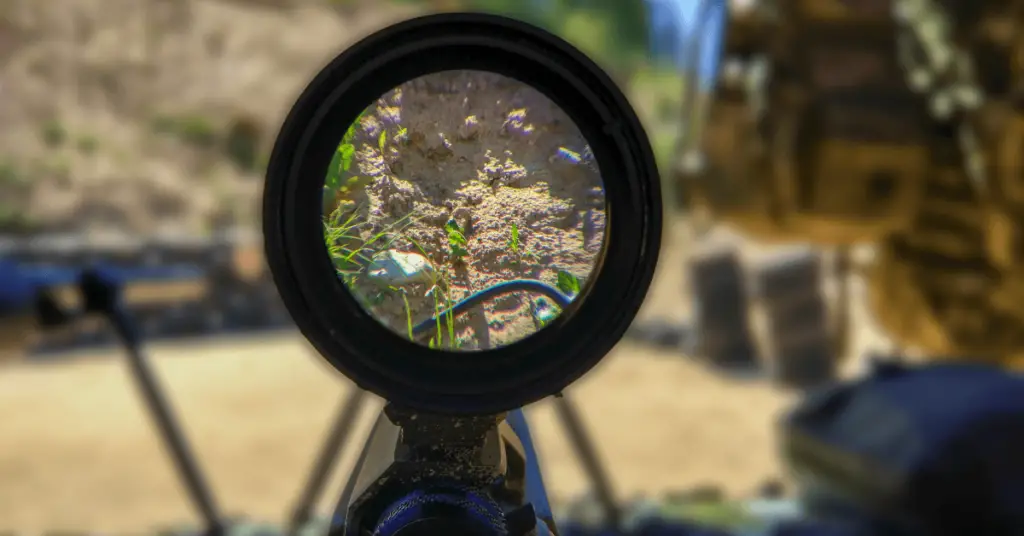There isn’t much difference between 40mm vs 50mm scope objective lenses. Also, contrary to popular perception, a 50mm lens doesn’t necessarily guarantee a brighter target image. A 40mm scope with premium lens and coating can also do just as good, if not a better job at that.
So, how do you know if 40mm or 50mm scope lens ideal for you?
To find out, let’s do a brief comparison on both 40mm and 50mm lenses and breakdown their merits and demerits.
Why the choice matters?
To get the best shot, you need a scope that’s comfortable to you and having the right lens size is a big part of that. From a brighter, wider field of view to a more compact size, there is a lot that makes both 40mm & 50mm scope lenses better over one another.
And yeah, the choice mostly comes down to what you need, and what you are gonna be using the scope mainly for.
5 things to consider in choosing between a 40mm vs 50mm lens
1. Scope Placement and Size
Depending on whether you are getting a 40mm or a 50mm lens, the place where the scope can be mounted on the gun can massively vary.
Since it naturally warrants a larger tube size, 50mm lenses typically are mounted higher on the gun which can cause an issue for some in regards to eye alignment and cheek comfort. To get the right perfect shots, having a low, consistent cheek comfort is very crucial. Obviously, a 40mm lens will offer more low-profile (and hence more comfortable) eye and cheek resting positions. This will also result in faster eye aligning.
With the 40mm lenses, you also have the benefit of having more choices when it comes to mounting rings, with most standard/medium ones being able to get the job done.
2. Scope Weight
If you already have a heavy gun and are conscious about piling on more weight, a 50mm lens is best to avoid for obvious reasons. For fast, efficient movements that are typical of hunting, a 40mm lens and its compact scope size will suit better. Making the right choice here is important because both can massively affect your gun’s overall comfort & functionality levels.
On the other hand, if you’re more of a stationary shooter or is into long-range sniping, the 50mm lenses and their visual benefits are worth the extra pounds.
3. Magnification levels
As the day gets older, the hunting range of your scope can decline more and more. in these scenarios, having a larger objective lens like 50mm, and its broader light-gathering powers can go a long way in extending your hunting time span while outdoors.
Having a 50mm lens also means that you don’t need to sacrifice magnification as much as you do with a 40mm lens in hopes of a brighter image.
4. Exit Pupil Considerations
Elaborating on how lens sizes can affect image brightness, the next thing you want to consider is the exit pupil differences. If you don’t know, the exit pupil is that beam of light that hits your eye while sighting through a riflescope.
In most cases, the larger 50mm lenses and their larger exit pupil can offer you the brightest images. This also offers greater head flexibility and fast targeting choices without much annoyance when it comes to scope shadows. That being said, the exit pupil size can also vary depending on magnification levels (with minimum zoom offering a bigger exit pupil).
Under bright conditions, the human pupil rests between 2-3mm, and under low light, it can expand up to 7mm. To get the best shots, you want the scopes exit pupil sizes to match as best as possible to your eye’s own, whether it be 40mm or 50mm lenses.
5. Resolution
As we said at the start, the image clarity of a lens is far more dependent on the quality of the glass itself and not just the size of it. Again, a high quality 40mm lens will always outperform a larger but poorly made 50mm lens.
In case they both share the same premium lens quality, however, the 50mm lens will definitely offer a brighter more clear target imaging, thanks to the larger sweet spot Aka the center portion of the lens being bigger than its 40mm cousin.
Conclusion
To summarize, if you want the best imaging possible and some extra perks to go along with it, get the 50mm lens. For those looking for max versatility and for everyone else, they would do great with the 40mm model.

Researched and written by the American Gun Facts team. We are a group of Americans dedicated to providing factual information on firearms and fighting back against attempts to weaken or discard the Second Amendment. We write on topics ranging from firearm statistics, news, reviews, and more! AGF has been featured in the New York Times, NBC, MSN, Time, & many other publications.
